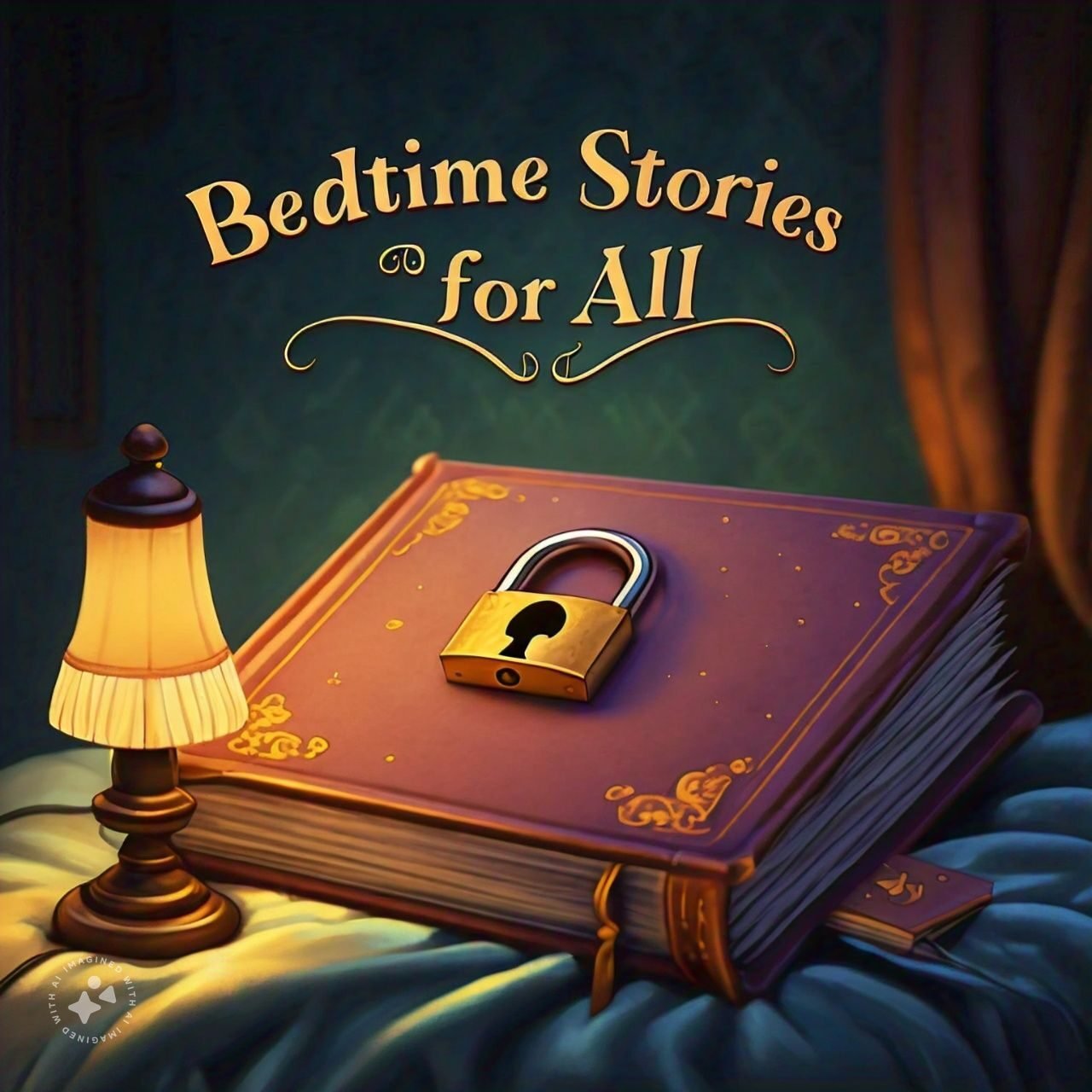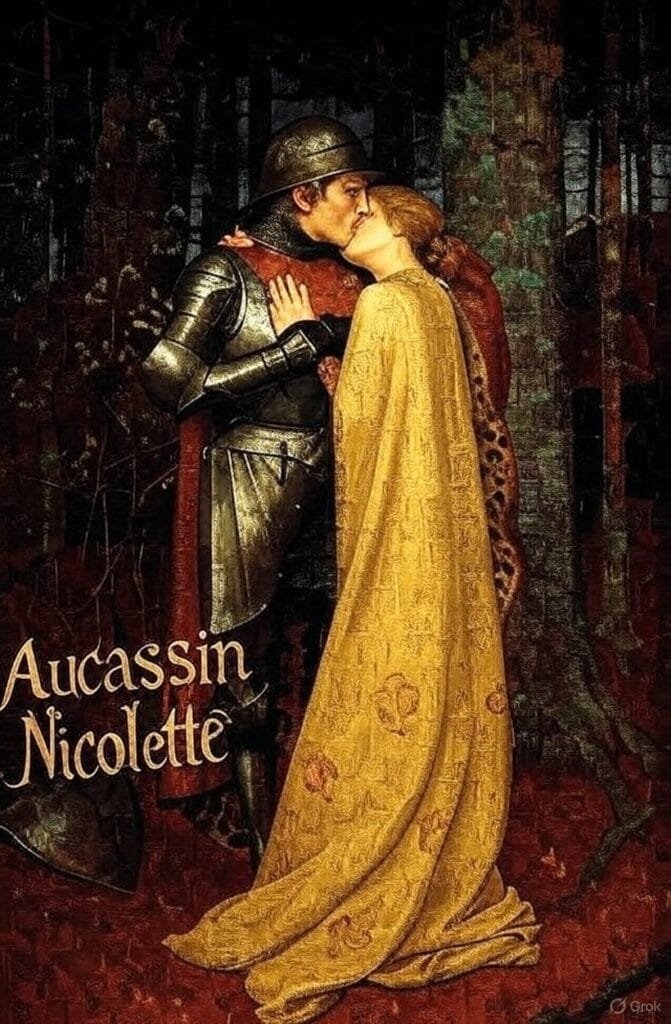Introduction: A Song-Story for the Ages
Let me introduce you to Aucassin et Nicolette, a remarkable medieval work that blends prose and poetry in what scholars call a “chantefable” or song-story. What makes this piece extraordinary is that we’ve preserved not just the text, but the original musical compositions that accompanied the verses – a rare treat for historians and literature enthusiasts alike.
This 13th-century French masterpiece stands out for its surprisingly modern emotional depth. While much medieval literature tends toward formalism, Aucassin et Nicolette delivers authentic, heartfelt passion that feels remarkably contemporary. The lovers’ exchanges possess a warmth and sincerity that was quite revolutionary for its time, especially when compared to the more restrained Teutonic traditions of the period.
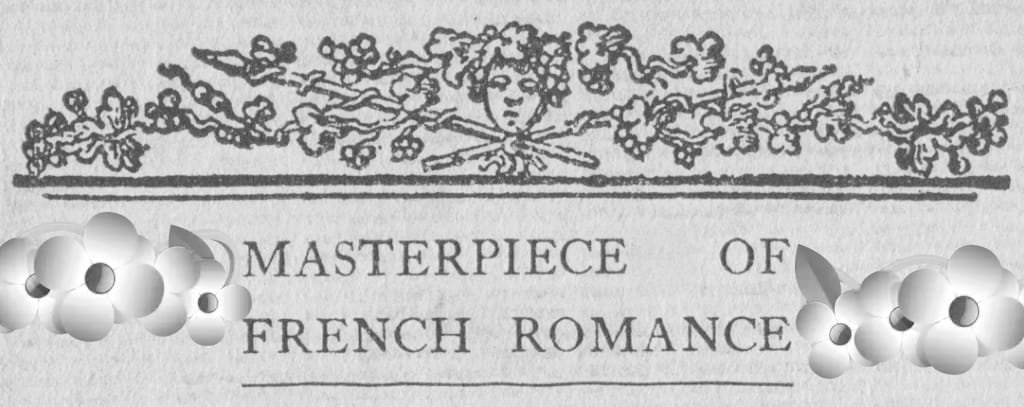
Oh, and get this – nobody knows who actually wrote it. Some anonymous genius decided to bless us with the ultimate medieval love story about Aucassin and Nicolette. And let me tell you, their romance isn’t some chaste, courtly nonsense – this is the real deal, full-on ride-or-die love that’ll make your heartache. Their relationship unfolds with such psychological authenticity that it continues to resonate with readers centuries later.
The Aucassin et Nicolette Story: The Count’s Desperation and the Lovers’ Defiance
A Kingdom in Crisis
The aging Count of Beaucaire found himself locked in a bitter territorial dispute with his rival, the Count of Valence – a conflict he was clearly losing. Time had not been kind to the old lord; his once-strong body now faltered, his strategic mind clouded by years. With death likely nearer than victory, he pinned all his hopes on his son Aucassin, the heir who stubbornly refused to act like one.
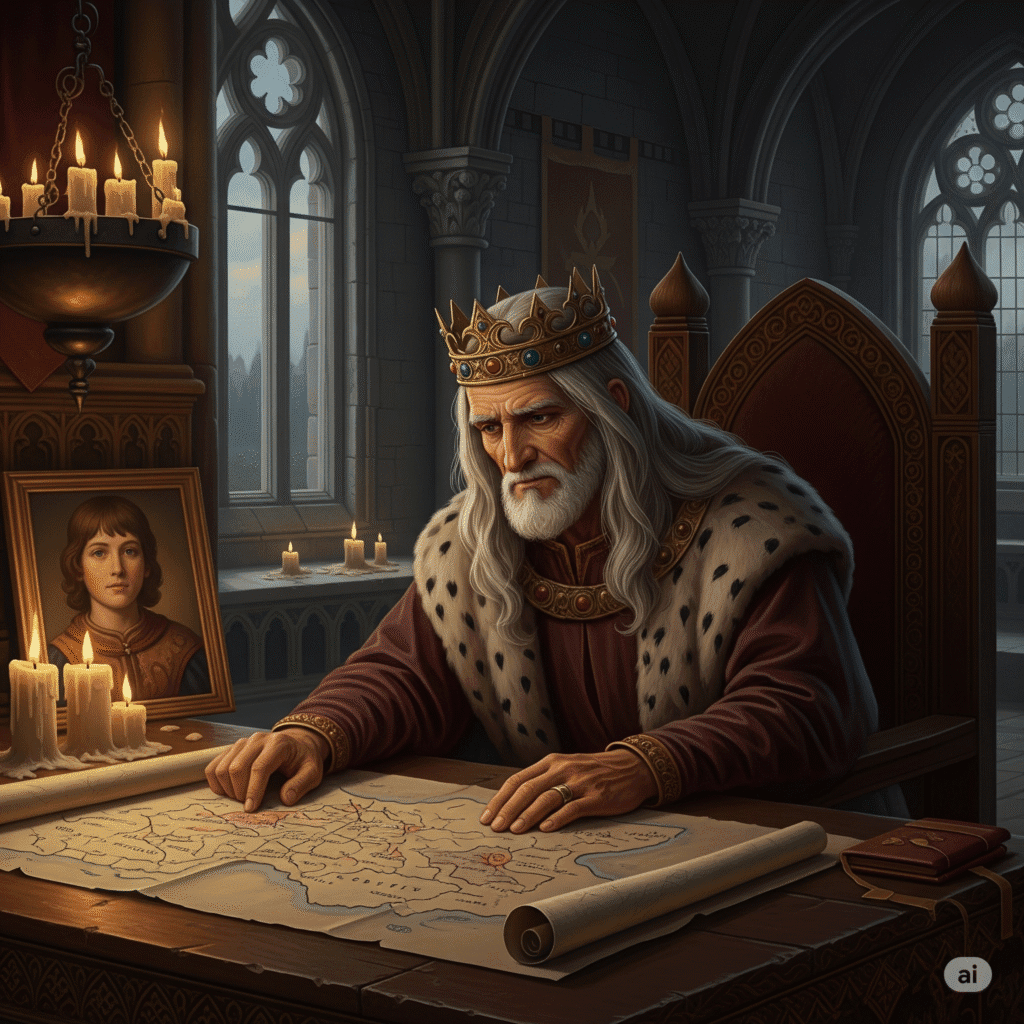
Love Versus Duty
Here was the irony: while Beaucaire’s forces crumbled at the borders, his son remained lost in lovesick dreams. The young man cared nothing for knightly duties, tournaments, or military glory – not when his heart belonged to Nicolette, that captivating Saracen convert. The count must have ground his teeth watching his sole successor moon about when their lineage needed defending.
A Father’s Ultimatum
In one particularly heated exchange, the frustrated father laid bare his objections: “Nicolette may have been baptized,” he argued, “but she’ll always be that foreign captive to our people. You’re throwing away your birthright, boy! With your standing, you could wed into any noble house in Christendom – perhaps even a king’s daughter!” His words carried the weight of medieval politics – and the desperation of a failing dynasty.

Schemes and Imprisonment
The Count’s Ruthless Plot
The old count’s words fell on deaf ears—Aucassin remained stubborn as a mule, his heart chained to Nicolette no matter what threats or promises his father made. Frustration festered in the Count of Beaucaire’s chest like a poisoned wound. He wasn’t just angry; he was calculating.
This wasn’t just about some foolish young love. No, his plans ran deeper, colder. A neighboring kingdom had a young princess—unmarried, politically valuable—and with her hand would come armies to crush Valence and lands rich enough to refill his coffers. Aucassin’s marriage was to be a transaction, not some troubadour’s ballad. But how could he barter his son’s future when the boy was lost in dreams of a Saracen girl?
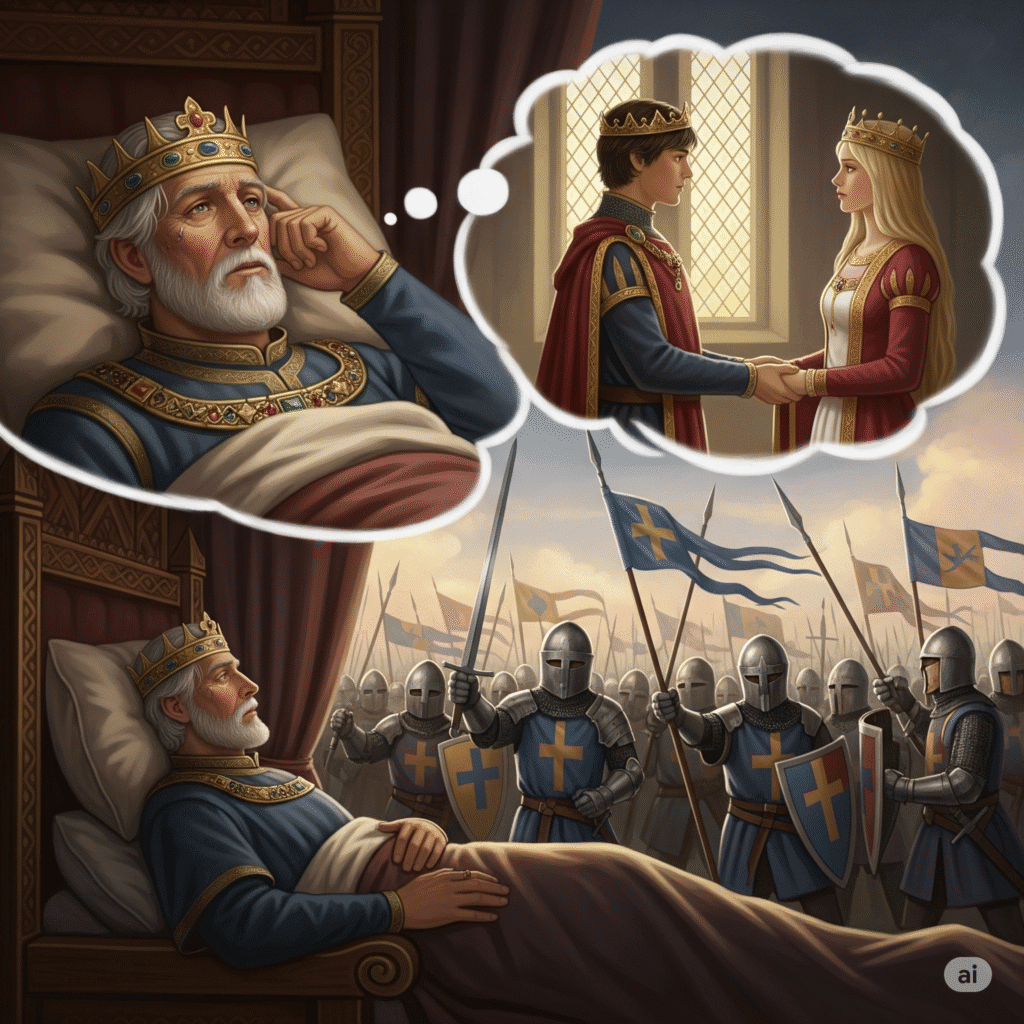
So the count did what desperate men do—he sought to cut the problem out at the root.
Storming into the chambers of Nicolette’s guardian, the old viscount, he didn’t bother with courtly niceties. His voice was a blade, sharp and merciless:
“Get rid of her. Ship her off, sell her, I care not—just make sure my son never lays eyes on her again. While he sighs over that foreign wench, Valence’s dogs snap at my gates!”
The viscount paled, but the count wasn’t finished. He leaned in, his breath hot with wine and rage.
“Mark me—if I see her face again, I’ll have her burned. And you? You’ll wish you’d never been born.”

The viscount’s blood ran cold – he’d seen men flayed alive for lesser offenses than crossing the Count. With trembling hands, he crossed himself and swore to obey. “It shall be done, my lord,” he whispered, the words ash in his mouth.
“Pray it is,” the Count growled, his signet ring biting into the viscount’s shoulder as he turned away, “lest you learn how slowly a traitor dies.”
Nicolette’s Captivity
Before the torches had burned down an inch, Nicolette found herself dragged up winding stone steps, her slippers scraping against the mortar. The tower room they threw her into smelled of damp wool and forgotten prayers. A crust of bread, a skin of sour wine, and some toothless crone for company – this was to be her world now.
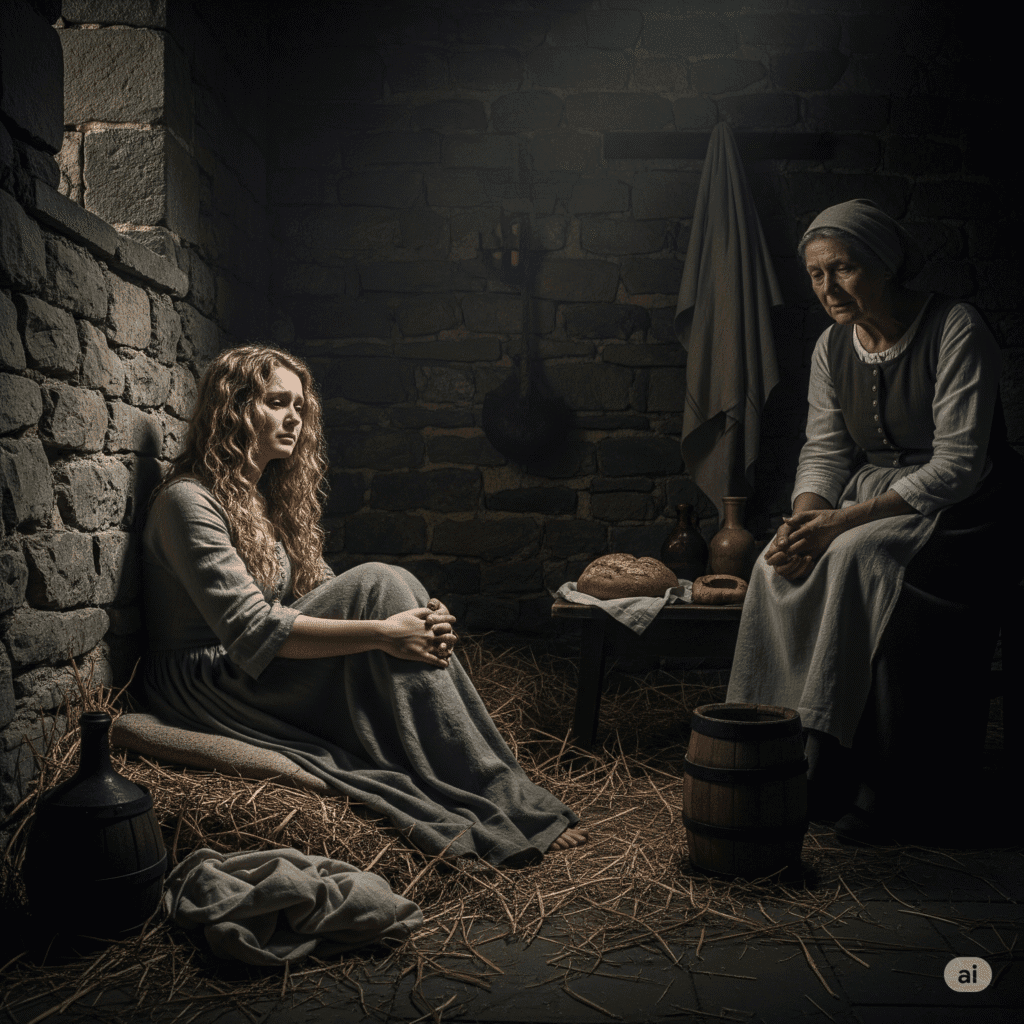
Through the narrow arrow slit, she could just see the courtyard where Aucassin often trained at arms. Pressing her forehead against the cold stone, she let the tears come. “My sweet fool,” she murmured, salt on her lips, “they think walls can keep me from you.” Her fingers traced the cross at her throat. “By Christ’s mercy, I swear this stone womb won’t hold me long.”
Love’s Rebellion
Aucassin’s Fury
Whispers slithered through Beaucaire like serpents in the rushes—”The Saracen girl’s vanished!” Some swore they’d seen her ghost near the millstream. Others muttered darkly that the Count’s men had buried her where the wolfsbane grows. When these poisoned words reached Aucassin’s ears, the lad nearly flew from his father’s hall in a fury, his cloak snapping like a war banner behind him.
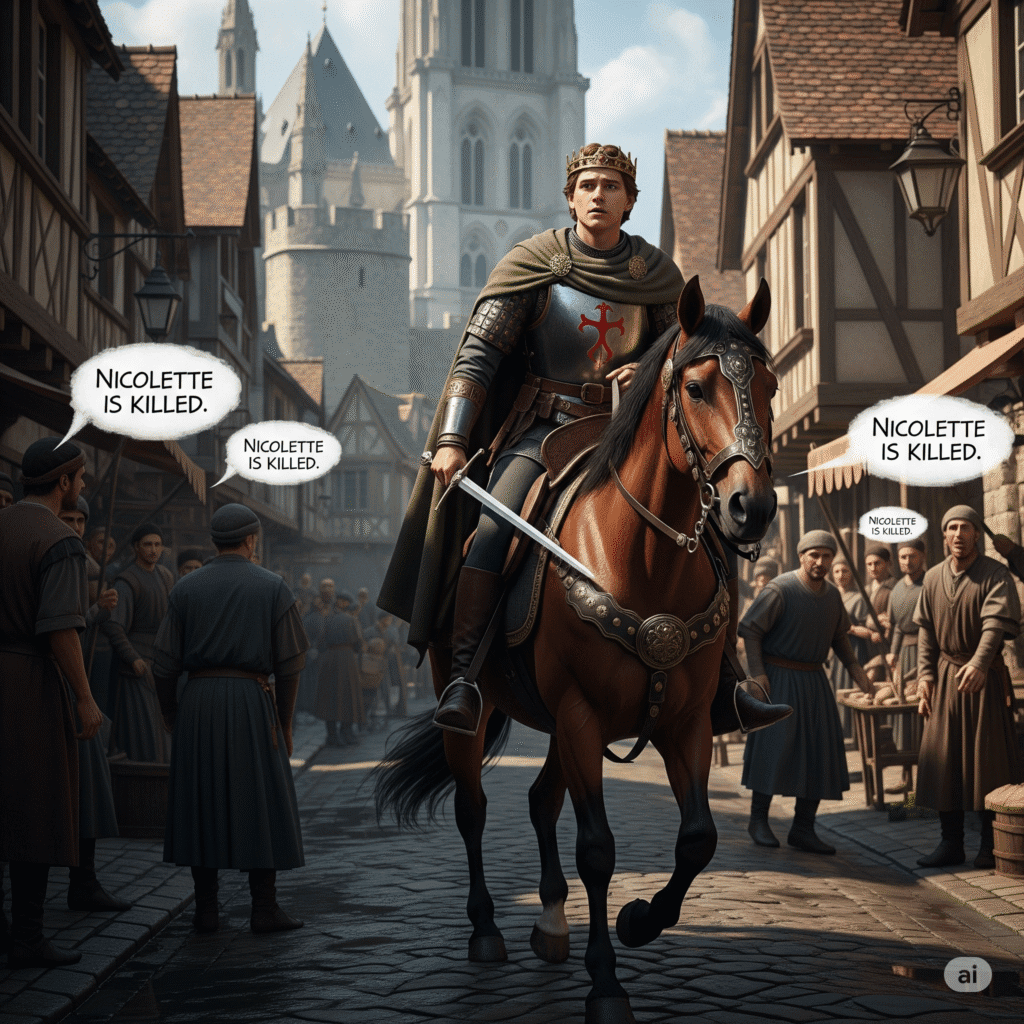
He found the viscount at vespers, gripping the trembling old man’s robe so tight the fabric groaned. “Where have you hidden my heart?” Aucassin demanded, his voice raw as a fresh wound. “By God’s own wounds, if harm’s come to her-“
The viscount crossed himself frantically. “Peace, my lord! The girl’s safe… from you. A baptized heathen’s get is no fit consort for-“
“Spare me your sermons,” Aucassin spat. “I’d trade a hundred paradises for one hour in her arms.”
The old man’s jowls quivered. “You speak madness! Paradise awaits those who-“
“What do I want with your paradise?” Aucassin laughed bitterly. “Your paradise is a miser’s counting-house. A heaven full of grumbling monks and whining beggars? Give me hell’s merry company – where the minstrels never cease their playing, where fallen knights still toast their ladies’ beauty, and lovers meet without priests scowling at their joined hands!”
The viscount mopped his brow with a trembling hand. “Christ have mercy, boy! If your father hears you rave so, he’ll roast that girl like a Michaelmas goose – and me beside her! Now away with you, before you doom us all!”
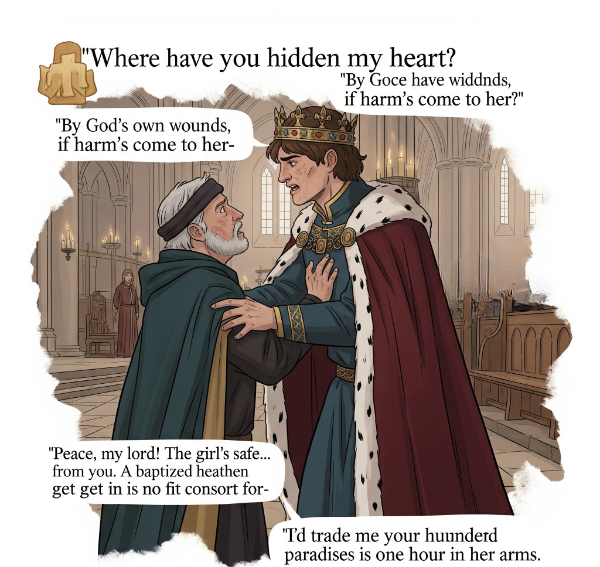
War and Broken Promises
The Bargain of Battle
Aucassin returned to the castle to find the banners of Valence gathering like storm clouds along the horizon. His father – that old lion with fading teeth – paced the battlements in a fury, his chainmail clinking like a miser’s coin purse. “For the love of God, boy!” the Count roared when he spotted his son. “Arm yourself! Take your charger and lead our men before Valence’s dogs tear down our gates!”
The young lord stood silent for three heartbeats – long enough for the sentries to exchange nervous glances. Then his face lit with sudden cunning. “Very well, father,” he said, his voice honey-smooth. “But when I return victorious… you’ll let me see Nicolette? Just for a moment? Just long enough to hear her voice and…” His fingers brushed his lips.
The Count’s knuckles whitened on his sword hilt. But the war horns were sounding, and desperate men make reckless bargains. “By my bloodline, I swear it,” he growled.

What followed became legend in the taverns. Aucassin fought like a man possessed – not for glory, but for the promise of a stolen kiss. When he dragged the Count of Valence through the castle gates by his own belt, the captive’s nose streaming crimson onto his fine surcoat, even the stable boys cheered.
Betrayal and Imprisonment
Aucassin shoved Valence forward, the captive count stumbling on the flagstones. “Twenty years of bloodshed ended in one morning’s work, Father,” he said, wiping his sword hand on his surcoat. “A fair trade for an hour with Nicolette, wouldn’t you say?”
The old count’s face darkened like a thunderhead. “Enough crowing, boy. Back to the field with you—glory won’t forge itself.”
“By the heavens!” Aucassin’s gauntlet clanged against his breastplate. “Are we merchants now, that sworn oaths melt like spring snow? Where is Nicolette?”
“Nicolette?” The count’s laugh scraped like rusted armor. “God strike me dead if I honor such a fool’s bargain! That heathen bitch should be burning at the—”
“Last word, then?” Aucassin’s voice dropped dangerously low.
“By every saint in heaven, yes!”
The young lord’s smile cut colder than his blade. “How pitiful—an old liar trembling before his own promises.”
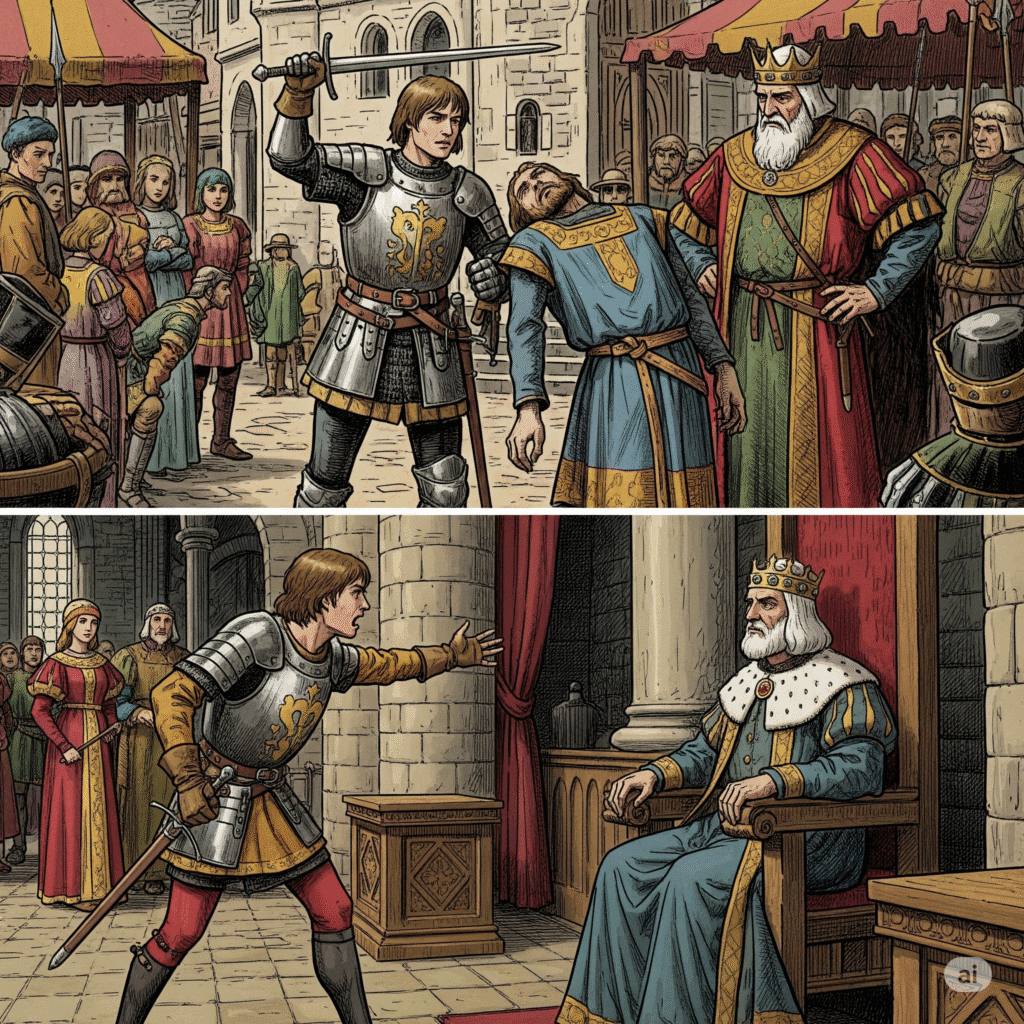
The count’s grizzled beard quivered. That final insult decided it—he snapped his fingers at the guards. “Take this lovesick whelp to the undercroft. Let the rats teach him what becomes of boys who shame their bloodline.”
They dragged Aucassin to a vault where the walls wept constant moisture. There, in the flickering tallow light, the victor of Valence became just another weeping boy, tracing Nicolette’s name in the mold until his fingers bled.
Nicolette’s Daring Escape
The May moon hung fat and yellow over Beaucaire that night, the sort of moon that makes young maids sigh and old men remember. Nicolette lay still as a effigy on her hard pallet, counting the old woman’s snores. When the twelfth snort rattled the chamber door, she moved.
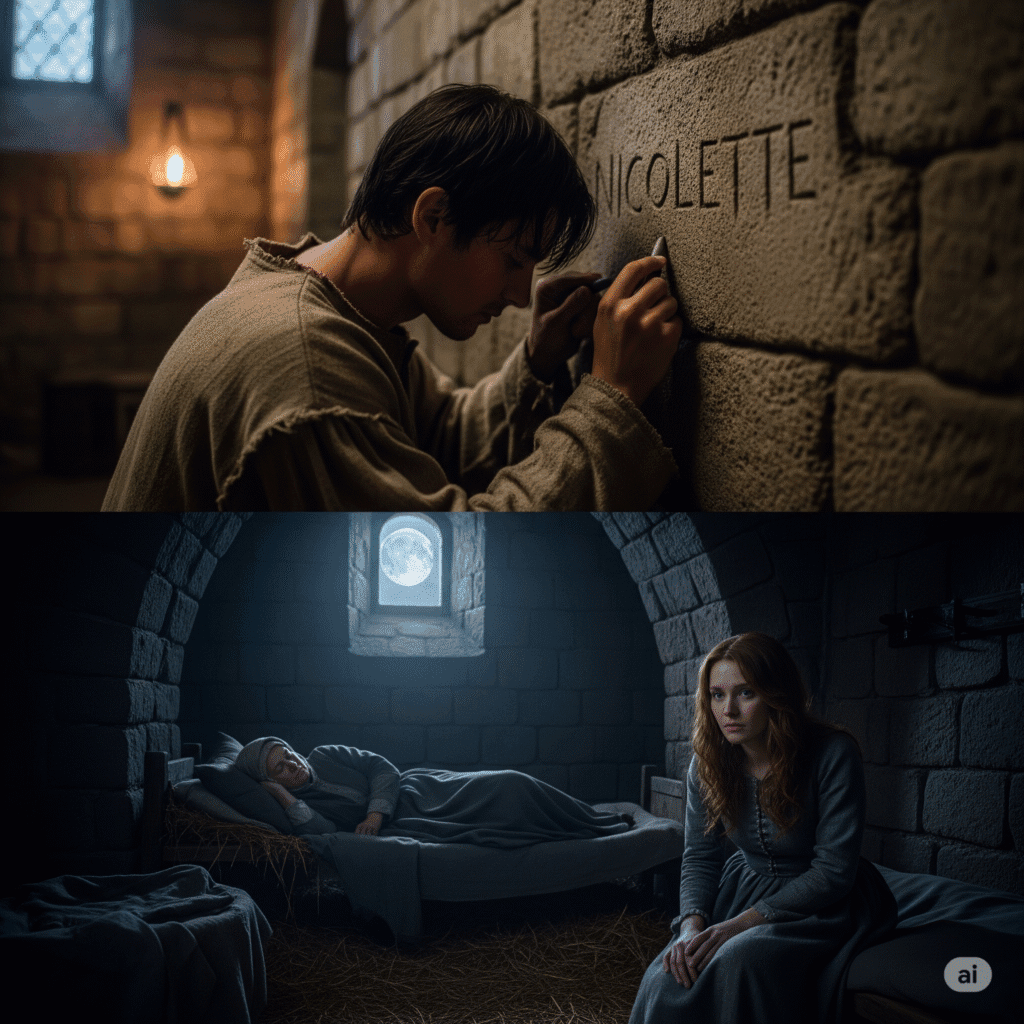
Night-time Flight
Moonlight turned her fingers to silver as they worked. The bed linens – rough homespun that had chafed her fair skin – now became her salvation. Each knot tied was a kiss stolen back from fate. The window bar groaned in protest as she tested her makeshift rope, but the nightingale’s song covered the sound.
God’s blood, how her slippers slipped on the castle stones! Every inch downward burned her palms, but the thought of Aucassin’s hands kept hers strong. Then – sweet Mary be praised – her bare toes found cool earth.
The grass wept dew onto her ankles as she gathered her skirts. Somewhere an owl called. Nicolette paused just long enough to pluck a white blossom and tuck it in her bodice – a token for her love, if God willed they’d meet again. The garden wall loomed ahead, its shadows hiding a hundred dangers. She crossed herself once, for the old woman’s sake, then vanished into the scent of lavender and danger.

Moonlight loved Nicolette almost as much as Aucassin did—it gilded her like a reliquary saint, catching in the spun gold of her hair, tangled from restless nights. Those wayward curls framed a face so delicately wrought, it might have been chiseled by some angelic sculptor. Her lips—ah, God’s truth, no June rose nor ripest cherry could match their redness. And her waist! A man might span it with his hands and still have fingers left to twine through hers. Even the white daisies she trod upon turned dark as sin in shame, so pale were her limbs against the night.
The Lovers’ Secret Meeting
She moved like a breath of wind toward Beaucaire’s grim walls, her bare feet whispering through the grass. Then—a sound that near stopped her heart. Aucassin’s voice, raw with grief, spilled from some unseen crevice in the tower stone. Pressing close, her lips almost touching the cold mortar, she called through the crack:
“Hush, my love. Your father’s hatred burns too hot—I must flee, or see you destroyed for my sake.”
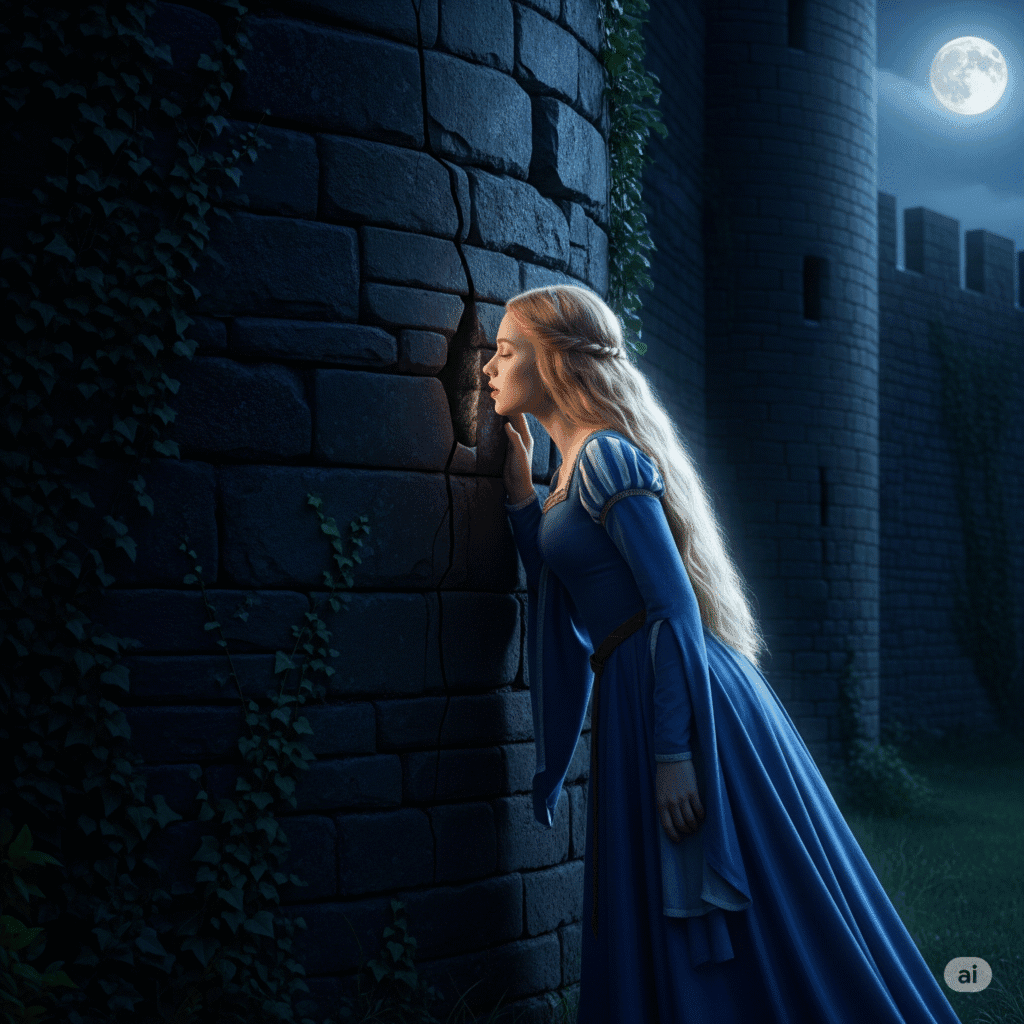
A blade flashed—one quick slice, and a curl of her hair, bright even in shadow, slipped through the gap.
Aucassin clutched it to his mouth, his tears salting the gold. “Then I’ll die here,” he swore, “for my soul won’t stay bound to a body parted from yours.”
Nicolette’s laugh was soft as the night breeze, though her own cheeks were wet. “Foolish boy,” she murmured. “And yet—how sweet, to learn your heart bleeds as mine does.”
Into the Wild: Hope and Reunion
But love, as they say, is rarely discreet—and their whispered meeting had not gone unnoticed. Old Guibert, the tower watchman, squinted through the gloom, his rheumy eyes catching the glint of Nicolette’s hair just as the tramp of boots echoed from the gatehouse. The count’s men were coming, their torches cutting through the mist like bloody fingers.
The old man hesitated. He’d seen enough burnings in his time.
“Girl!” he hissed down, voice cracking like dry parchment. “To the woods—now! Unless you fancy dancing at your own pyre!”
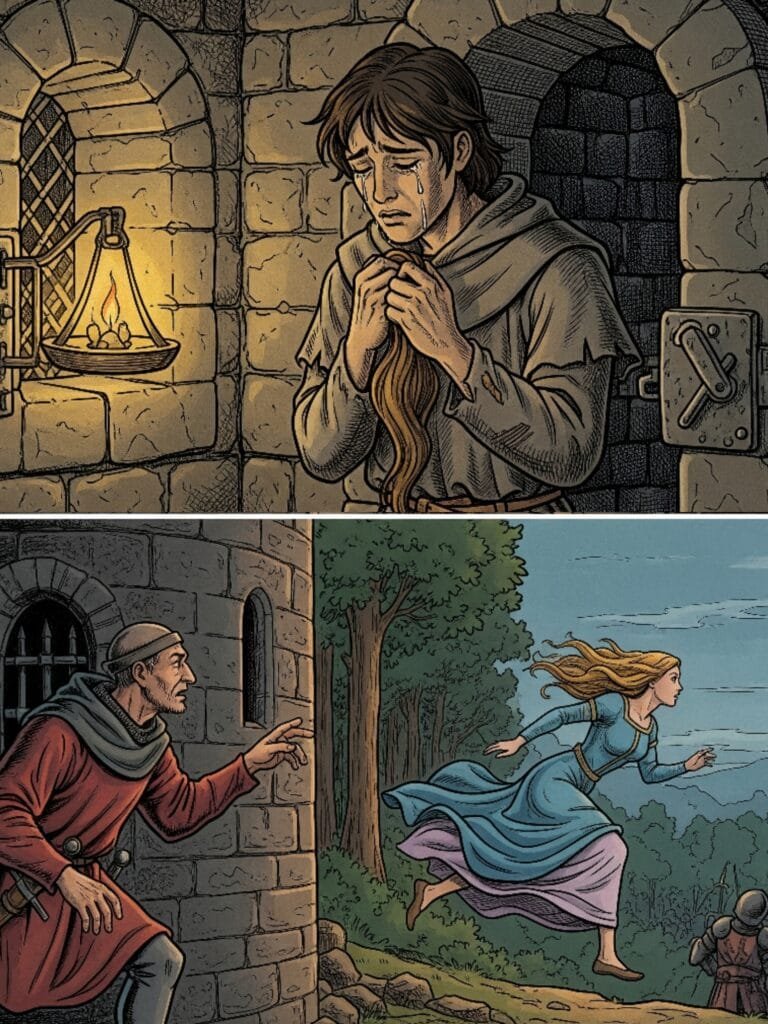
Into the Forest
Nicolette’s breath hitched. One last glance at the tower’s weeping stones—where Aucassin’s muffled sobs still leaked through—then she was gone, her bare feet flying over dew-slick grass as the forest swallowed her whole.
That night, she slept fitfully beneath a hawthorn bush, its thorns snagging her dress like grasping fingers. When dawn’s pale light finally roused her, it was nearly noon. Hunger gnawed at her belly as she crept toward the sound of voices—shepherds, by the stream’s edge, unwrapping their midday bread.
The Shepherds’ Message
“God’s peace upon you,” she called, stepping into the light.
The youngest shepherd choked on his ale. “And—and upon you,” he stammered, crossing himself twice. The others eyed her warily. This was no peasant girl—not with that silk gown and face like a cathedral Madonna.
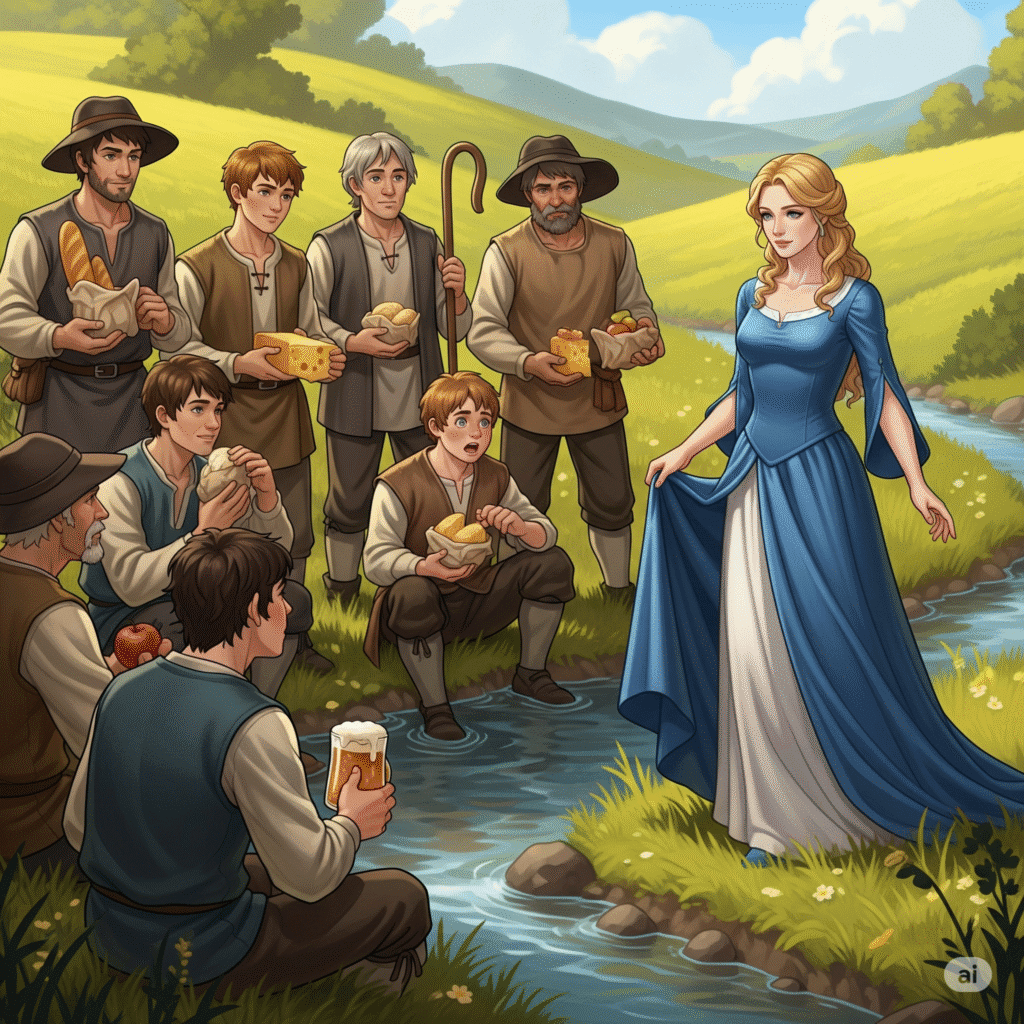
“You know Lord Aucassin?” she asked.
“Aye,” muttered the eldest, wiping cheese grease on his tunic. “Moping about like a sick calf these past weeks.”
Nicolette’s smile was bittersweet. “Then tell him… a rare beast hides in these woods. One that could cure his melancholy.” She pressed silver into the man’s calloused palm. “But he must come himself—within three days—or the creature will vanish forever.”
The shepherds exchanged glances. “Fairy nonsense,” scoffed one, though his fingers closed tight around the coins. “We’ll not play messenger for your kind. But if the young lord passes this way…”
Nicolette nodded, already turning away. She walked until seven paths twisted together like lovers’ fingers, then built a bower of wild thyme and poppies—a signal only Aucassin would understand. As dusk fell, she withdrew from the place, and hid among the oaks, her heart pounding in time with the nightingale’s song, waiting to see if Aucassin would come.
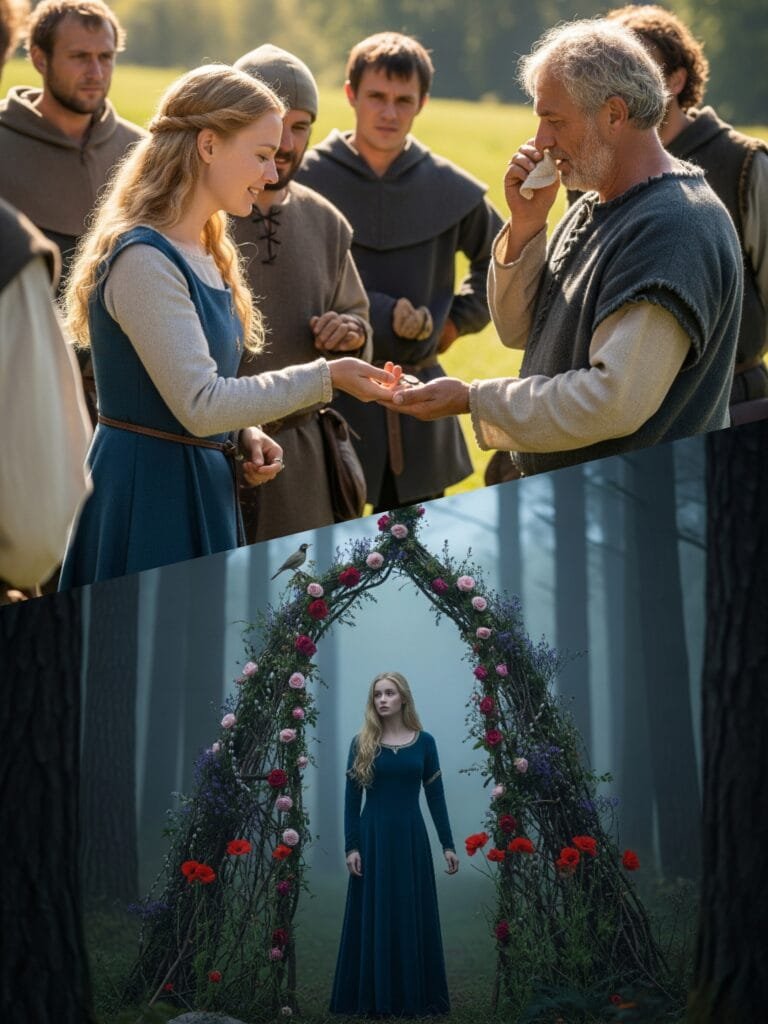
The Lovers’ Triumph
Whispers slithered through the countryside like adders in the grass—Nicolette had vanished again. Some swore they’d seen her spirit near the millpond at twilight; others muttered the Count had finally silenced her for good. When these poisoned rumors reached Aucassin, he wept until his ribs ached—while his father, grinning like a fox in a henhouse, ordered the prison doors flung open.
“Enough moping!” the Count declared, sloshing wine onto the feast-table. “Tonight we celebrate your return to sense!”
But Aucassin only pushed mutton around his trencher, deaf to the minstrels’ songs. When the laughter grew too loud, he slipped away—past drunken knights snoring in the rushes, past the kennels where his favorite hound whined to follow. The stableboy dozed as Aucassin saddled his bay courser, its warm breath huffing against his neck like a conspirator.
As he reached the dense shade of the forest, it felt as though nature embraced him. The branches of the trees bowed over him, as if whispering: “We were waiting for you, lover. Now hurry, she awaits you…”. Then the forest swallowed him whole.
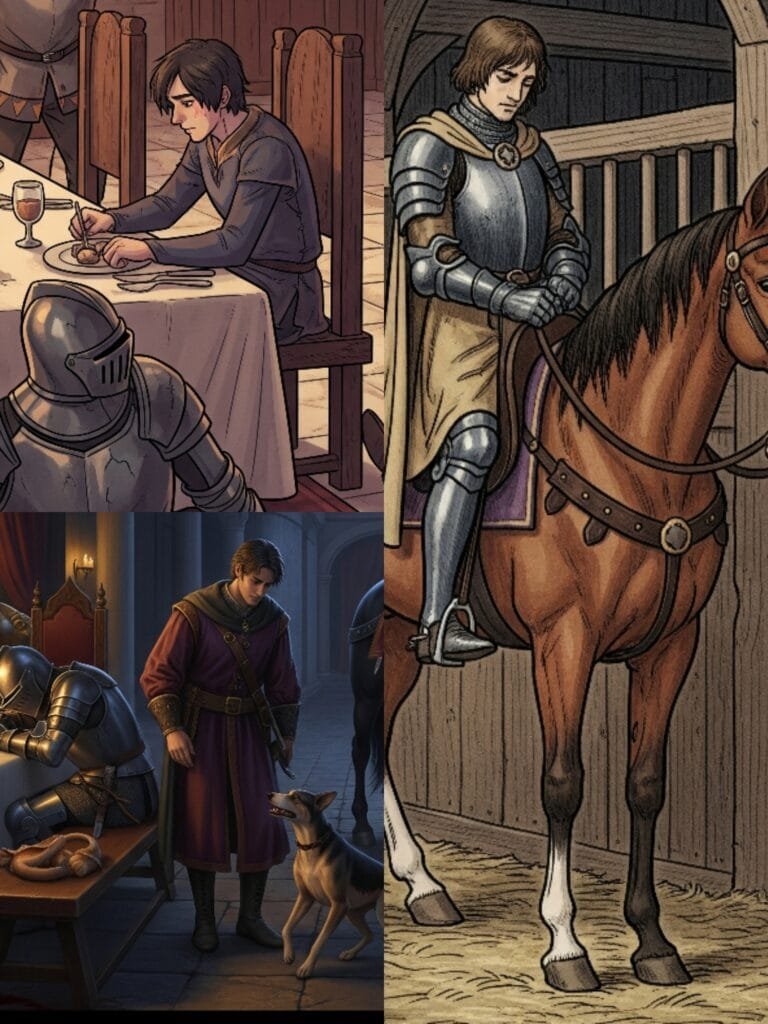
Aucassin’s Quest
He’d ridden barely a league when shepherd voices tangled with birdsong. Dismounting, he crept closer—just in time to catch “…a lady like moonlight herself…”
“God’s peace, good men. My name is Aucassin, son of the Count of Beaucaire,” Aucassin called, startling them.
The shepherds scrambled up, wiping greasy hands on woolen tunics. The boldest—a gap-toothed fellow with a nose like a turnip—eyed the young lord’s fine cloak. “And… and peace to you, milord.”
“What lady did you speak of just now?”
The shepherds exchanged glances. But when Aucassin’s silver flashed in the dappled light, turnip-nose spat in his palm and confessed:
“A lady, milord—all silk and sorrow. She came and spoke to us while we were setting out our meal on the grass. She asked if we knew Aucassin, the son of the count. Said there’s a beast in these woods could cure your heartache. We told her fairies aren’t to be trusted!”
Aucassin’s pulse roared in his ears. Nicolette.
Bidding the shepherds farewell, he cast the coins aside, mounted his steed in one fluid motion, and rode headlong into the forest depths—his hope aflame, fiercer than the midsummer sun.

The forest whispered as Aucassin rode, his heart beating a mad rhythm against his ribs. “No ordinary hunt, this,” he murmured to the twilight, “I track no hart nor boar—only the ghost of your footsteps, Nicolette.” Brambles clawed at his cloak like jealous suitors as daylight bled away, but he pressed on until the seven paths knotted together—and there, glowing in the moonlight, stood a bower woven from wild roses and young willow shoots.
“Her hands built this,” he breathed, dismounting so hastily that he sprawled face-first onto the roots. A jagged stone bit into his shoulder, but what was pain when love waited? Gritting his teeth, he secured his horse and crawled inside—only to freeze as a familiar scent of lavender and sun-warmed skin enveloped him.
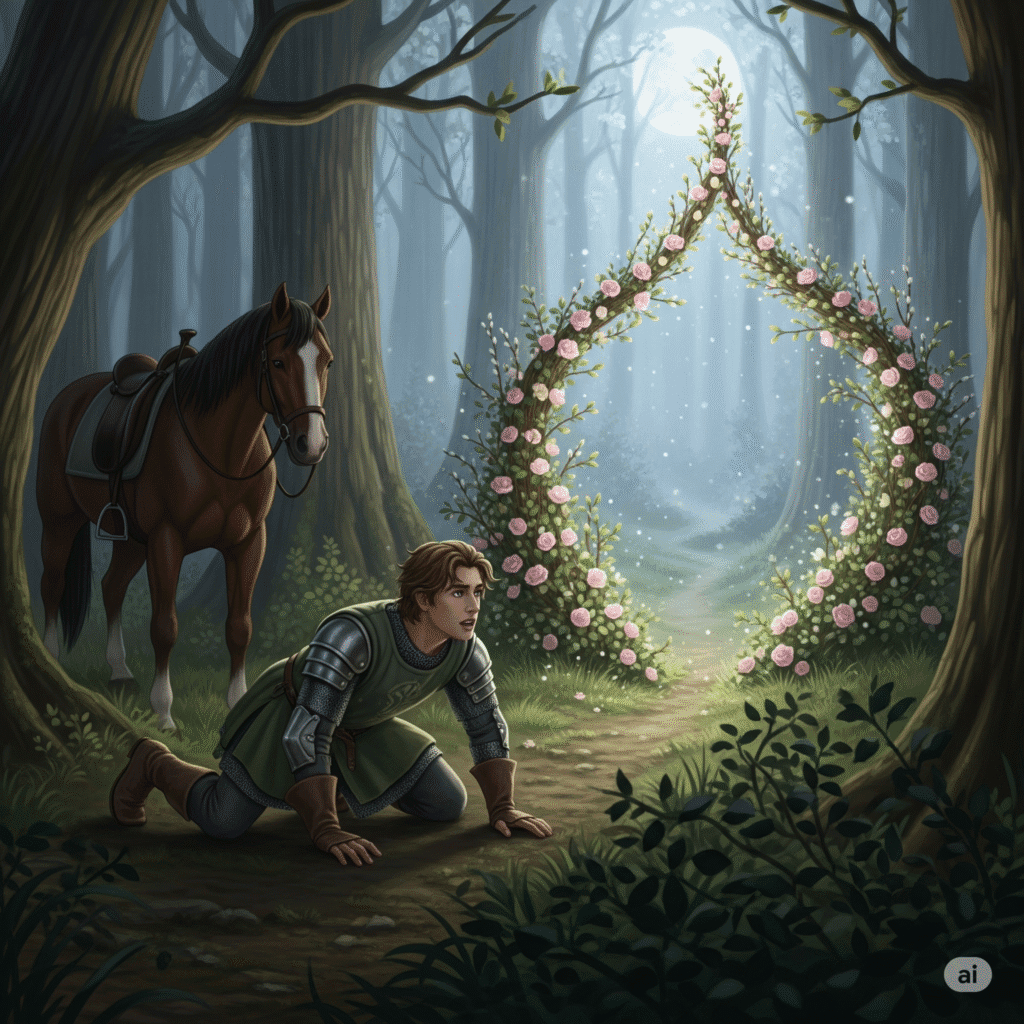
The Reunion
Nicolette burst from the shadows like a second moonbeam, her arms locking around his neck so fiercely he gasped.
“At last!” she cried, her lips finding his in the dark.
Aucassin laughed against her mouth, his fingers tangling in her unbound hair. “Sweet thief, you’ve stolen all my hurts away.”
Her hands—clever, urgent—explored his shoulder until she found the wound. In moments, she’d pressed a poultice of crushed violets and yarrow to his flesh, the herbs cool as forgiveness. When he sighed in relief, she tensed.
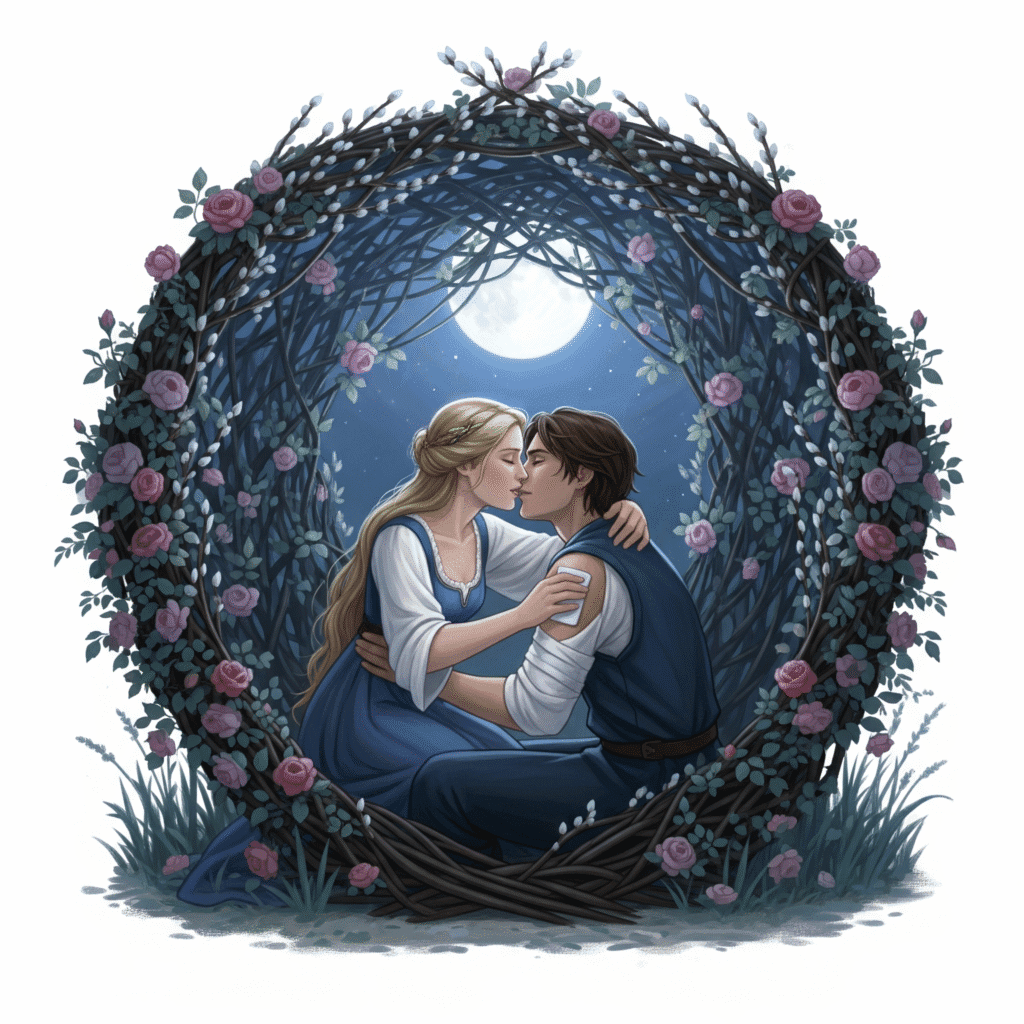
“Dawn comes too soon, love. If your father’s men find us—”
“Then we ride now,” he interrupted, already pulling her toward the horse. “Not away—but toward. Toward everything.”
Toward Freedom
As he lifted her onto the saddle, their future unfurled before them like a road gilded by the rising sun. Behind lay Beaucaire’s towers, its hatreds, its chains. Ahead? Only the horizon—and the endless sky where two shadows melted into one.

Conclusion: A Love That Endures
Aucassin et Nicolette is more than a medieval fairy tale—it’s a testament to the power of love to defy kingdoms, break chains, and inspire generations. Their story, preserved in song and story, continues to captivate hearts with its blend of rebellion, devotion, and hope.
If you enjoyed this retelling, then share it with your friend😇!
- 14 Best Panchatantra stories in hindi
- 15 Best Children Stories in English from Panchatantra 2.0
- 16 Best Aesop's Fables in Hindi with moral lessons
- 17 Best Aesop's Fables with moral lessons for children
- Arabian Nights
- Author's Best Written Stories in English
- Author's Best Written Stories in Hindi
- Baital Pachisi बैताल पचीसी in Hindi
- Bedtime Stories for All
- Hindi Love Stories
- Love and Romance
- Vikram and Betal series: Riddle Solving Stories
You can join my WhatsApp Channel by clicking the link here
